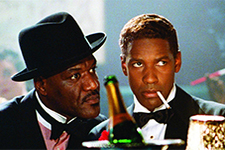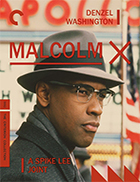Malcolm X (4K UHD)
|  The opening credits of Spike Lee’s epic biopic Malcolm X are instructive in the way they promise a film that he ultimately doesn’t quite deliver. The initial credits fade in and out against a stark black backdrop as we hear a voice introducing Malcolm X to a boisterous crowd who is eager to hear his words. “Are we going to bring him on?” the speakers asks rhetorically, and then answers, “Yes, we’re going to bring him on!” As the applause swells on the soundtrack, the screen is suddenly filled with a giant American flag and Terence Blanchard’s epic horn- and drum- and choral-filled score begins pounding in the speakers as the film’s title fades in, creating an immediate and stark contrast between the name of the controversial civil rights leader at the heart of the film and the symbol of the country he saw as one history’s greatest oppressive forces. But, Lee isn’t done. As the credits continue, we begin to hear Denzel-Washington-as-Malcolm-X fiercely orating a series of charges against “the white man,” including being “the greatest murderer on earth,” “the greatest kidnapper on earth,” and “the greatest robber and enslaver on this earth.” At this point, Lee begins cutting in bits of grainy video footage of Rodney King being beaten on the ground by Los Angeles police officers, a still exceedingly raw wound in America’s racial history, especially at the time of the film’s release. And then the flag begins to burn, first from the edges and then near the middle, eventually burning down into an enormous X. This opening credits sequences takes less than three minutes, but it packs so much incendiary visual and auditory and ideological power that you can’t help but feel that the remaining three-plus hours will be a literally overwhelming experience. And, at times, it is. But, what is most curious about Malcolm X is how fundamentally conventional it is. Its subject is radical and unconventional and at times contradictory and difficult, but the form in which Lee chose to tell Malcolm X’s story fits right into all the conventions of the Hollywood biopic. It didn’t necessarily have to be that way. James Baldwin had been hired by producer Marvin Worth back in 1968 to write a screenplay based on The Autobiography of Malcolm X as told to Alex Haley, but the three disjointed, French New Wave-esque drafts he wrote were constantly revised into something more traditionally palatable, and he eventually abandoned the project (his screenplay was eventually published in 1972 as One Day, When I Was Lost). One of those scripts was written along with Arnold Perl, who later wrote the Oscar-nominated 1972 documentary Malcolm X. Lee then added to Perl’s revision of Baldwin’s original script, although only he and Perl were credited in the end because Baldwin’s estate asked that his name be removed since the final product differed so substantially from what he had originally written. The film opens in Boston in the mid-1940s, were we first meet Malcolm X as Malcolm Little (Denzel Washington), a swinging youth who favors bright zoot suits, straightened hair, and white women. He and his best friend Shorty (Spike Lee) end up connected with a local mobster, “West Indian” Archie (Delroy Lindo). Malcolm is rechristened for the first (but not the last) time as “Detroit Red,” and he and Shorty successfully run numbers and other scams until they are busted for burglary and wind up in prison. It is there that Malcolm meets Baines (Albert Hall), a fellow inmate who introduces him to the rigorous teachings of the Nation of Islam (Baines is a convenient fictional character through which Malcolm’s transformation from petty hood to devout religious leader can be dramatized). When Malcom is paroled in the early 1950s, he travels to Chicago and meets Nation of Islam leader Elijah Muhammad (Al Freeman Jr.), who renames him Malcolm X and eventually elevates him to major status as spokesman within the Nation of Islam, where he preaches a fiery brand of black nationalism and racial separation that makes him a lightning rod for the intertwined powder kegs of race, religion, and ideology. It is during this time that he meets his wife, a nurse named Betty (Angela Bassett), and he later falls out of favor with Elijah Muhammad, who Malcolm discovers has fathered numerous children out of wedlock and against the teachings of Islam. Breaking from the Nation, he journeys to Mecca where he meets Muslims of different colors and nationalities, which leads to his changing views on both race and religion. As he appears in virtually every scene in the film, Denzel Washington is central to its success, as he not only creates a believable and moving screen version of Malcolm, right down to the clipped delivery of his oratory and sharp physical movements, but also embodies the intensity and passion of Malcolm’s beliefs, which conflicted with both dominant white American culture and black integrationists who saw the future of the country as the proverbial melting pot while Malcolm preached separation of the races (Washington had previously played Malcom on-stage in Laurence Holder’s 1981 play When the Chickens Come Home to Roost). It is that Malcolm who is highlighted in the film’s opening credits, but what makes the film work is that Lee is most interested in the journey Malcolm took and the way in which his views shifted and evolved. As co-writer and director, Lee is largely reverential to Malcolm the historical figure, highlighting his fervent beliefs and unwavering commitment to integrity within those beliefs, although he also allows room for Malcolm the human being to reflect on his earlier rhetoric, especially in light of his ecumenical turn. Given Malcolm X’s complex and contentious place in American political history, it is not surprising that there was no end of controversy about Lee’s film. Lee had already proved his willingness to tackle racial issues head-on within the context of Hollywood cinema, particularly in his masterful drama Do the Right Thing (1989), which was interpreted as a both a call to understanding and a call to arms. As Lee put it during an interview at the Cannes Film Festival, “It isn’t the job of movie makers to offer solutions. All we can do is to present the problems.” Malcolm X does exactly that in dramatizing racism in America, which Malcolm approaches differently at different points in his life (denying his race as a young man, preaching racial separation at the height of his power within the Nation of Islam, and finally looking for middle ground), which naturally led to all manner of controversy because so many factions wanted Malcolm X to reflect “their” Malcolm X (for his part, Lee took full responsibility for the film and its portrayal, saying that “this is the Malcolm I see” and writing an entire book about the film’s production). While such contention is inevitable with any biopic, it is especially pertinent here given the heightened focus on race in American in the early 1990s, the historical proximity of the events it depicted (it had been only 25 years since Malcolm’s assassination), and the fact that no one had attempted to make a non-documentary feature film about Malcolm X. Lee was criticized significantly by factions of the black community, particularly by poet and critic Amiri Baraka, creator of the group United Front to Preserve the Legacy of Malcolm X. Lee persisted, bringing his own artistic personality to bear on the film for better and for worse. Those who find much to celebrate in the film rightly recognize the scope and the depth that Lee was able to achieve. His insistence that Warner Bros. give him a cinematic canvas stretching well beyond the three-hour mark was essential to telling Malcolm’s story, even as it still necessitated certain elisions, condensations, and artistic license. Lee was clearly influenced by Oliver Stone’s radical montage approach to history in JFK (1991), although he uses such intercutting sparingly. Washington’s commanding central performance and the intensity with which the story is told make the film feel both brisk and invigorating, challenging our notions of history and what it means to be black in America, then and now. The film’s detractors have their points as well, and I will concede that some of Lee’s artistic flourishes come to the film’s detriment, particularly an absurdly enlarged moon in a flashback to a Ku Klux Klan attack on Malcolm’s house when he was a child and Malcolm’s borderline-silly vision of Elijah Muhammad in his prison cell. There are times when you wish that Lee would inject himself a little less, but it is still difficult to deny the weight of his achievement.
Copyright © 2022 James Kendrick Thoughts? E-mail James Kendrick All images copyright © The Criteron Collection | |||||||||||||||||||||||||||||
Overall Rating: 


 (3.5)
(3.5)


